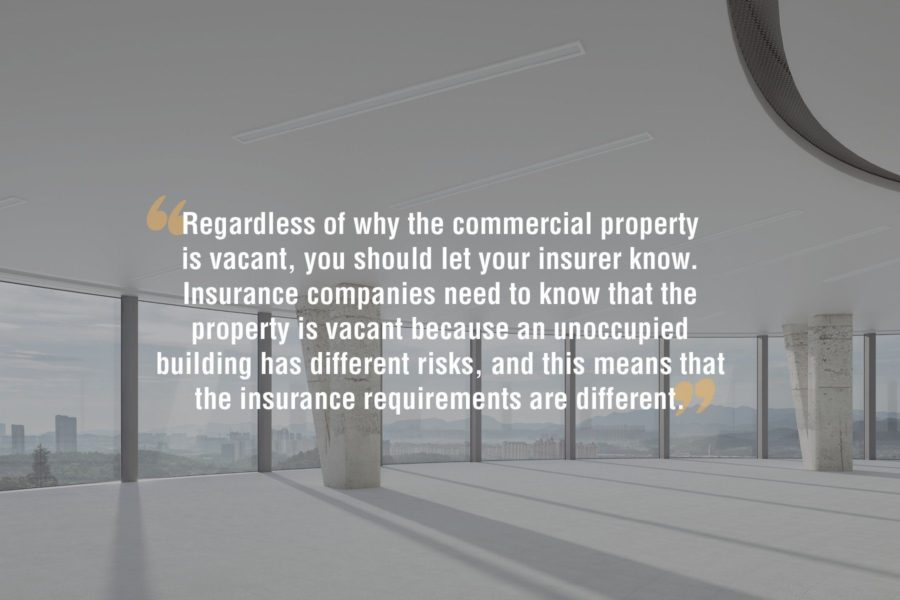If you have a vacant commercial property, you need vacant property insurance. Unoccupied and vacant properties are subject to many of the same risks that occupied properties are subject to. Vacant and unoccupied properties may also be vulnerable to additional risks. Maintaining the proper property insurance for unoccupied commercial properties is essential.
Notify Your Insurance Company If You Vacate a Property
During the pandemic, many offices that used to be occupied were suddenly left vacant. Outside of the pandemic, a property can become unoccupied for many different reasons. For example, perhaps you are leasing a commercial property to a tenant, and then the tenant leaves. As a result, the property will be left vacant until a new tenant can move in. This may be a short period of time, or it may go on indefinitely.
Regardless of why the commercial property is vacant, you should let your insurer know. In fact, your insurance policy may require you to notify the insurance company if your property will be vacant for a certain period of time, such as 30 or 60 days. Insurance companies need to know that the property is vacant because an unoccupied building has different risks, and this means that the insurance requirements are different.
You may need to purchase a specialized vacant property insurance policy. If your property will only be vacant for a short period of time, you may need short term vacant property insurance.
The Risks Faced by Vacant Property
Many of the risks that threaten a property do not disappear just because the property is vacant. Storms, for example, can strike a vacant property just as easily as an occupied one. Vacant properties also have additional exposures, and certain risks may be exacerbated because no one is on hand to identify a problem when it first occurs and take steps to prevent more damage.
Crime poses a significant threat to vacant buildings. The property may be damaged by vandals. For example, windows may be broken, and walls may be painted with graffiti. Squatters may move into a vacant property and cause additional damage.
Fires are also a major risk. According to the National Fire Protection Association (NFPA), approximately 30,200 structure fires occurred in vacant properties each year between 2011 and 2015. These vacant building fires results in direct property damage losses of $710 million each year, as well as an average of 60 civilian deaths, 160 civilian injuries and 3,310 firefighter injuries.
Fires can have many causes, including improperly put out cigarettes and other accidents, lightning strikes and faulty wiring. However, arson is a common cause of fires in vacant buildings. The NFPA says that half of vacant building fires were set intentionally, compared to only 10 percent of all structure fires.
Many threats to vacant buildings stem from people – including vandals, arsonists and squatters – but damage may also occur as a result of natural causes and the absence of people. For example, storms and winter weather may cause leaks to form. Without people around to notice and repair the leaks, water damage may become severe. Mold is also a problem, and if mold is not addressed, it can cause structural damage and become a health hazard. Pests, including rodents and termites, may also cause problems in a vacant building.
Contents and Personal Property in Unoccupied Buildings
A vacant property might be called vacant or unoccupied. An unoccupied property often still has personal property inside, such as furniture, equipment and other items. A vacant property usually does not contain personal property because all items have been removed.
When determining appropriate insurance coverage, it is important to consider whether coverage is needed for personal property as well as the structure.
Liability in Vacant Properties
You might assume that there’s not much risk of injury in a vacant property, but this isn’t necessarily true. For example, if a property is being shown to prospective tenants or buyers, someone could be injured during one of these showings.
Injuries may also occur in conjunction with renovation work. For example, someone might trip over a cord left by a worker or slip on spilled materials. If doors or windows are left open or unlocked, children may enter the property to explore, and they could be injured.
Given these risks, it is important to consider liability issues and appropriate coverage for your vacant properties.
Steps to Protect Your Vacant Property
If your property is vacant, you need to make sure you have the right vacant property insurance for it. You should also take steps to keep the vacant property safe.
- Keep the property well maintained. Someone should inspect the property regularly for signs of leaks, pests and other damage, and repairs should be made before the damage gets worse.
- Keep plants on the property well maintained, as well. This can prevent fire hazards and clogged drains and gutters. Keeping plants trimmed can also reduce the number of spots where trespassers could hide easily.
- Invest in security. A good security system may help you monitor the property for damage and trespassers. You may also want to have a security company patrol the property occasionally.
- Let the police know. It’s a good idea to inform the local police of the vacant property. This will allow them to keep an eye on the property and note any suspicious activity.
- Stop delivery. You don’t want junk mail and other deliveries to pile up, so make sure deliveries are stopped while the property is vacant.
- Keep the doors and windows secure. You don’t want to make it easy for curious children or opportunistic criminals to get inside your property. Make sure the doors and windows are secure. Boarding up windows is an option, but neighbors may object because boarded windows are considered an eyesore, and it can also draw attention to the fact that a building is vacant.
Purchasing Vacant Property Insurance
Because of the additional risks to vacant properties, vacant property insurance may have higher premiums than property insurance for occupied buildings. However, having insurance for vacant properties will be essential if you have to file a claim. Otherwise, your claim may be denied because you don’t have the right coverage or because you did not notify your insurer as you were required to do under the terms of your policy. It’s important to note, also, that vacant property insurance policies often have exclusions for certain types of claims, like theft.
If you have a vacant property, your existing policy may not provide adequate coverage. Talk to your one of our brokers about your coverage needs.





